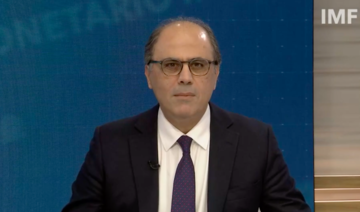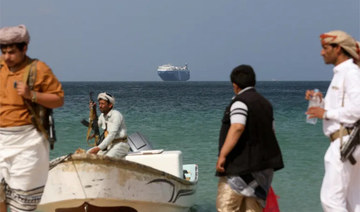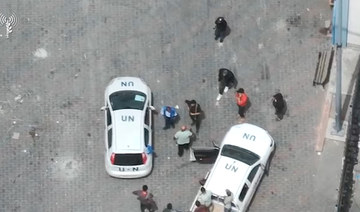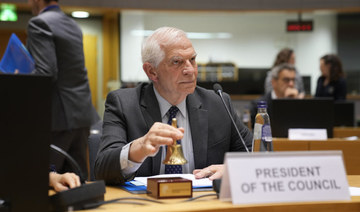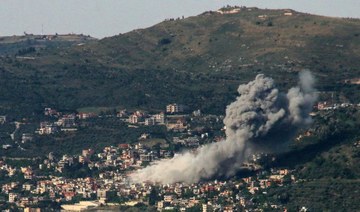DUBAI: Houthi attacks on shipping in the Red Sea and the Gulf of Aden are no way to express solidarity with the Palestinian people in Gaza, according to Timothy Lenderking, the Biden administration’s special envoy for Yemen.
Lenderking, a career member of the US Senior Foreign Service, made the remark on “Frankly Speaking,” Arab News’ current affairs show.
Since the Israel-Hamas war erupted in October last year, the Iran-backed militia has been launching missiles and drones from Yemen not only at Israel, but also at commercial and military vessels in the region’s waterways.
The militia says that its actions are an expression of solidarity with Gaza — a claim Lenderking strongly disagrees with, citing the resultant “increasing freight and insurance costs” and higher prices in general.

Timothy Lenderking, the US special envoy for Yemen. (US State Department)
“It’s just unfortunate that the Houthis have chosen to convey their solidarity with the Palestinians, which many people feel, many Americans feel, many regional countries feel, by attacking regional shipping,” Lenderking told Ali Itani, the host of this episode of “Frankly Speaking.”
“It’s as though I have an issue with my neighbor, and I go and burn down the neighborhood grocery store. It makes no sense.”
He added: “This action by the Houthis is doing nothing to help the Palestinians, nothing to alleviate the suffering of Gazans at all. In fact, on the contrary, it’s complicating the movement of vital supplies into Gaza. So, this is also an adverse effect of what the Houthis are doing. It is simply the wrong reaction.”
The US State Department only recently announced the listing of “Ansarallah, commonly referred to as the Houthis, as a Specially Designated Global Terrorist group.”
Yet, between 2015 and 2022, Houthi missiles repeatedly struck civilian infrastructure and population centers in Saudi Arabia and the UAE, some of which killed civilians.
The State Department had listed the Houthis as a foreign terrorist organization in January 2021 in the last days of former president Donald Trump’s administration but revoked the designation less than one month later when President Joe Biden took office.

Timothy Lenderking, a career member of the US Senior Foreign Service, spoke to Ali Itani of Arab News on “Frankly Speaking,” on the repercussions of the crisis precipitated by ongoing Houthi attacks on regional shipping. (AN photo)
Lenderking said the recent relisting of the Houthis as a terrorist group was a response to their attacks on civilian and commercial ships “in a reckless, indiscriminate manner,” adding that more than 50 nations have been affected by the latest violence.
“This is becoming a global problem, raising prices, increasing freight costs and insurance costs — not for the wealthy, but for those moving wheat,” Lenderking said.
“This is hurting all sorts of consumers and ordinary people all over the world. And that’s why there’s been such a short, such a sharp reaction and why the reaction is growing against this Houthi behavior.”
Defending the US decision to revoke the Houthis’ terrorist designation in February 2021, Lenderking said that despite some “detestable aspects of (Houthi) ideology” and a litany of documented human rights violations carried out by the group, the US “felt that removing the designation would lessen the stress on humanitarian networks in Yemen,” something that was a priority for the Biden administration.
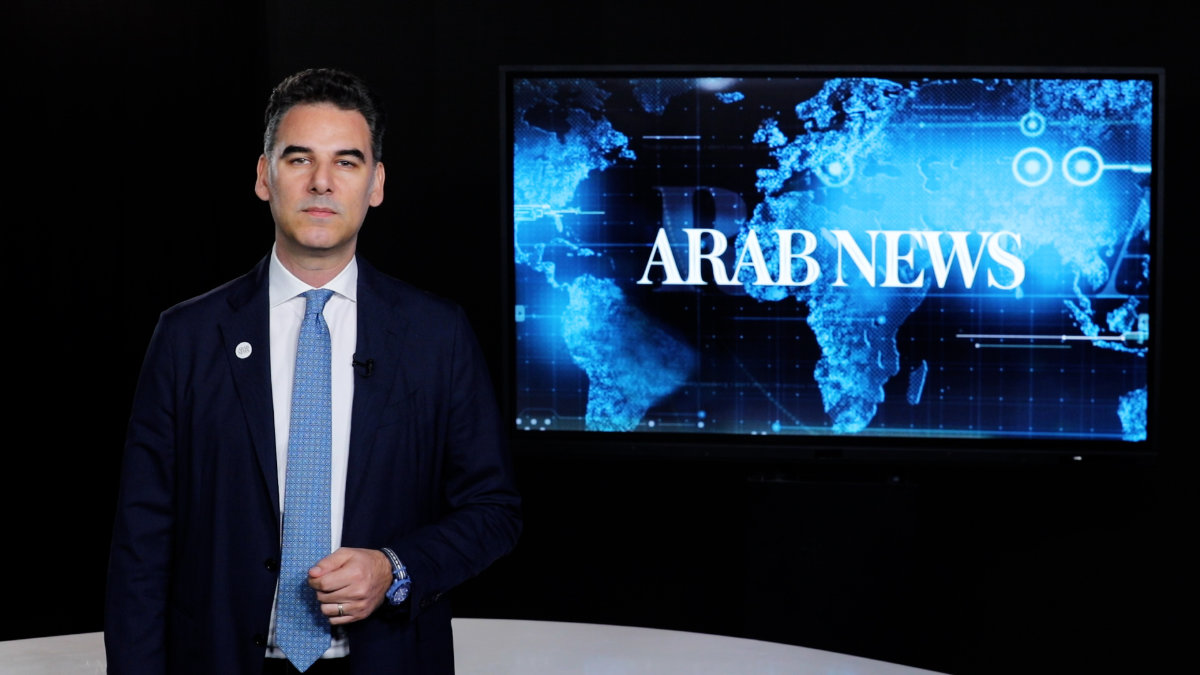
Frankly Speaking special host Ali Itani. (AN photo)
“The reason that we removed that terrorist designation three years ago was because the US wanted to set a new course with Yemen, and with this conflict, and to put incredible priority on ending the war in Yemen, which had raged for almost eight years at that point,” he said.
“And it clearly was the right decision, as over the next period of time leading into April 2022, neither side was able to score a military victory over the other. And a key international point was fulfilled; that is that there is no military solution to the conflict. That is still the case.”
He added: “We’ve put serious money on the table to try to help ordinary Yemenis deal with the problems and challenges of the war, the damage to infrastructure. That remains a commitment,” he said.
“And we’re very eager to get back to a Yemen that is moving forward toward a peace deal, moving beyond the truce into a durable ceasefire, Yemeni-Yemeni political talks. This is still our goal.”
Now that the terror designation has been reinstated against the Houthis, there are concerns that humanitarian aid projects will face disruption.
“We are very cognizant of that and very concerned about it,” said Lenderking. “That’s why we felt that the specially designated global terrorist designation, or SDGT, was an appropriate tool at this particular time.
“It does provide carve-outs, licenses to ensure that humanitarian organization, basic commerce, movement of food, fuel, medicine to Yemenis will continue so that the vital work of NGOs and the UN can proceed in Yemen, and all those workers who are working in very, very difficult circumstances in Yemen to provide help to the Yemeni people.
“And so we’re fulfilling our commitment to the Yemeni people while at the same time, really shining the spotlight on the reckless behavior of the Houthis and trying to demonstrate how that’s hurting them and also hurting Yemen.”
Though the US has repeatedly affirmed its support for a peaceful, non-military solution to the decade-long Yemeni conflict — backing up its promises with more than $5 billion in humanitarian aid since the start of the conflict — the strikes against the Houthis have cast doubt on Washington’s commitment to peace.
“On the contrary, the US has been a huge backer under this administration of a strong peace effort, which has delivered results,” said Lenderking. “There’s been a truce for two years. It’s largely held, that truce, despite all of the other turmoil in the region.
“So, it’s hugely disappointing on our part to see that the Houthis have chosen to attack international commerce, the international economy, in a way that has nothing to do with the purported purpose of those attacks.”
Lenderking said that the Central Command’s retaliatory strikes were limited to military targets only. “The targets that have been selected are all missile sites and storage facilities, UAV (unmanned aerial vehicle) capabilities that are specifically aimed at international shipping,” he said. “They are having a significant impact in degrading that capability.”
He underscored the importance of keeping the Houthis focused on the peace process in Yemen as opposed to the war in Gaza.
“I think we all recognize that we are not going to solve any of the problems in the region if we have to keep dealing with these attacks on shipping. So, let the Houthis de-escalate this effort, we de-escalate, and we can move the focus back to helping the Gazans in a genuine and effective way. And also working toward a genuine and durable peace in Yemen.”
Progress toward this genuine and durable peace is being undermined, however, by the continued smuggling of weapons to the Houthis by its primary backer, Iran.
“Here we see the very negative role that Iran is playing,” said Lenderking. “Those weapons that are being shipped to the Houthis, to be used in a variety of ways to antagonize the region, to attack global shipping, those weapons come from Iran.
“They’re not coming from other countries. They’re coming from Iran, in violation of UN Security Council resolutions not to fuel the conflict through providing weapons to the Houthis.
“This is exactly the kind of negative role that the Iranians are playing, even though they’re trying to portray the activity of Hamas and the Houthis as justified. This is not justified. And international conventions and law indicate that.”
He added: “We do need the Iranians to dial back their lethal support for the Houthis, encourage the Houthis, as they have done on some occasions, I must note, to return their focus to the peace effort in Yemen and stop fanning, fueling the conflict.”
Although the US and its coalition of allies responding to the Houthi threat to shipping have sought to portray the attacks in the Red Sea and the Gulf of Aden as a separate issue to the Israel-Hamas war in Gaza, Lenderking recognizes they are a symptom of the Middle East conflict.
“We’re all very keen to see immediate, measurable, demonstrable improvement in the lives of Palestinians in Gaza and to see that the maximum amount of humanitarian assistance can be brought to the Palestinian people there,” he said.
“That was very much the focus of Secretary Antony Blinken’s most recent travel to the Gulf region and to Israel. I accompanied him on part of that trip, in the Gulf, and the conversations that we had with Gulf leaders in Qatar and Saudi Arabia and the UAE, there was a great deal of convergence on the importance of increasing humanitarian supplies to Gaza. So, that is not just a US priority, it’s a regional priority and an international priority.
“Unfortunately, what the Houthis are doing is interfering with that priority, making that goal even more difficult. So, this isn’t an act of solidarity with the Palestinians in a concrete way that is helping them. As I say, it is hurting the Palestinians.”
One area where the Gulf states align with Washington is the need to secure the two-state solution as a means of resolving the decades-old Israeli-Palestinian conflict. Although the Israeli government of Benjamin Netanyahu is pushing back against the proposal, Lenderking says it remains the ultimate US goal in the region.
“Part of the root cause is that there is no state for the Palestinians,” he said.
“That’s why you see the US leadership so focused on the two-state solution, which is seen as ultimately the way to address the concerns that are being reflected in the Gaza conflict, and why the US is leading regional efforts to do that, and why this administration is so determined to see that positive result come through this.
“But this is all no excuse for any regional actor to create more stress on the regional economies, to create more stress on regional conflicts by firing indiscriminately into international shipping lanes.”




